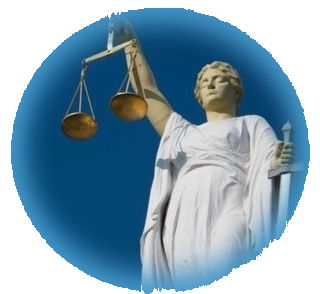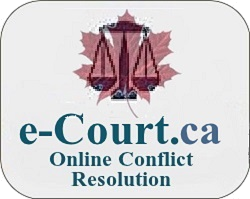Frequently asked questions :

1. Why does e-Court calls itself a court ?
2. Is there any likelihood of confusion with the name court?
4. Are the e-Court judges and/or arbitrators truly independent and impartial?
6. Who ensures the quality of e-Court and how is its legal quality monitored?
7. Is the resolution on e-Court legally binding?
9. Who will be deciding a verdict?
10. Does it matter where the arbitrator is located?
11. What kinds of disputes can be resolved on e-Court?
12. What are my options if the other Party does not abide by the arbitrator's decision?
13. What laws are used to determine the outcome of a dispute?
15. Does it cost anything to use e-Court?
16. How does e-Court use our information?
17. Are our documents and data secure?
19. Is video conferencing available?
21. What are my options if I think the arbitrator's decision is incorrect?
22. Is e-Court a government organization?
23. Why do users love e-Court ?
CLAVIS:
Foreign Arbitral Awards Convention ActWhy does e-Court calls itself a court ?
According to Webster dictionary a court is " an official assembly for the transaction of judicial business". Case law means "law established by judicial decision" A judge is "a person who speaks right." The terms 'court' and 'judge' and 'right' and 'litigation' are not legally protected. Nobody has the exclusive right to the use of those words.
On the basis of the following, e-Court is referred as a private court: 1. A transparent, predictable adversarial proceeding; 2. Competent and experienced professional judges and/or arbitrators; 3. Reliable and impartial judges and/or arbitrators; 4. An affordable procedure, including the legal costs of legal aid; 5. A binding verdict.
Is there any likelihood of confusion with the name court?
Are the e-Court judges and/or arbitrators truly independent and impartial?
What clause should I use in agreements to ensure that e-Court is used to resolve a future dispute?
Any controversy or claim arising out of or relating to this contract, or the breach thereof, upon the request of either party, shall be settled by final and binding arbitration administered by e-Court online at www.e-Court.ca under its Arbitration Rules, in lieu of litigation, and judgment on the award rendered by the arbitrator(s) may be entered in any court having jurisdiction thereof for enforcement purposes.

Parties who joined e-Court as registered member are entitled to place the e-Court logo on websites and stationary and receive their own e-Court email box. By accepting their membership they automatically endorse the terms, rules ®ulations
Who ensures the quality of e-Court and how you monitor its legal quality?
The administration and board of the Foundation is responsible. The independent supervisory board supervises the administration. Both in terms of legal quality, the safety of the website and incoming and outgoing moneyflows. e-Court has taken measures to guarantee the legal quality ( view also selection procedures ), these include: 1. The selected judges and/or arbitrators are specialized in civil law. 2. Judges all have formal law school education with at least 10 years experience as a lawyer. 3. Judges can be (retired) notaries, lawyers and judges. 4. The administration and board of the foundation as well the supervisory board read all rulings for quality. Also view Arbitration Law in Canada Is the resolution on e-Court legally binding? Yes. The verdict of e-Court has the same effect as a verdict of a traditional government court and is based on 'contract' law according to Canadian common and civil code legislation. To be valid and therefore legally binding, five conditions must be met, please view conditions
e-Court provides a pre-arbitration agreement which the Parties sign online. In this agreement the Parties agree to abide by e-Court's Arbitration Rules and to be legally bound by the arbitrator's decision.
The arbitration decisions made by the arbitrators on e-Court are enforceable in courts of law in the US, Canada, the UK, Australia, South Africa, and 144 other countries that are signatories to the New York Convention. A list of the signatory countries is available on the UNCITRAL website
e-Court has taken all measures to safeguard information. The website is heavily protected like internet banking with leading banking institutions. The security of the site remains constant in our attention.
The SSL protocol is used by millions of e-Business providers to protect their customers ensuring their online transactions remain confidential. In order to be able to use the SSL protocol, a web server requires the use of a SSL certificate. Sites will get SSL encryption to cover any area that involves an exchange of data including login boxes, credit card payments, or any personal information. All web browsers have the ability to interact with SSL secured sites so long as the sites SSL is from a recognized Certificate Authority. The Internet has successfully created many new global business opportunities for enterprises conducting online commerce. However, that growth has also attracted fraudsters and cyber criminals.
The increasing awareness of online fraudsters and cyber criminals has presented an opportunity for ecommerce providers to capitalize on consumer fears by displaying trust indicators. Just like the real world, people need to be confident before they proceed down an unknown path. When a SSL Digital Certificate is installed on a web site, users can see a green padlock icon inside the browser. View also Video
Who will be deciding a verdict?
Depending on the wishes of the Parties to the arbitration, e-Court will either assign an experienced arbitration attorney or a retired judge from e-Court's list of arbitrators that have been vetted and pre-approved by e-Court's advisors; e-Court's advisors can be found on our "Advisors & Arbitrators" page. Or the Parties can choose their preferred arbitrator whether they are part of our roster or not.
In absence of an agreement between the Parties to the contrary, e-Court will assign an arbitrator from its pre-approved list of arbitrators based on expertise required for that particular dispute.
Does it matter where the arbitrator is located?
No, but notwithstanding this e-Court attempts to offer the conflicting parties "if available and applicable " a choice of an arbitrator or judge from their own jurisdiction or from a different one. However, an arbitrator does not have to be located in your jurisdiction for the arbitration Award to be legally binding and enforceable in court in your jurisdiction. Due to various national, state and provincial arbitration laws and The Convention on the Recognition and Enforcement of Foreign Arbitral Awards it is irrelevant where the arbitrator lives or where the arbitrator served on the Bench. The arbitrator can even be in a different country as long as it is one of the signatory countries to the New York Convention.
What kinds of disputes can be resolved on e-Court?b
Most types of business disputes can be resolved on e-Court.
Scope of e-Court :
e-Court handles civil matters common to medium size & small businesses and individuals in accordance with either the common law and/or the civil-law tradition in Canada. Business dispute examples: partnership disagreements, non-payment for goods or services, inadequate goods or services delivered after payment, supplier disputes, debts owing, breach of contract, employment, landlord-tenant, lease, franchise disagreements, real estate agreements, et cetera. e-Court is able to resolve many other business disputes.
e-Court shall not consider bankruptcy law, criminal matters, fiscal and administrative matters. Other areas covered by e-Court are ( not inclusive ): Property - boundary disputes, trespass Work-related disputes - unfair dismissal, personal injury Defamation of character Consumer disputes - Faulty goods, 'trades description' offences Intellectual Property Law Contract Law Construction Law Family Law & Divorces Business Law
Environmental Law
Entertainment Law Immigration Insurance Sports Law Trusts & Estates Wills & Probate Is the area relative to your situation not mentioned above? Send us an email via : info@e-court.ca or call the Service Desk.
What are my options if the other Party does not abide by the arbitrator's decision?
This rarely happens. It is highly unlikely that the other Party would risk ignoring the Award since they agree in the pre-arbitration contract to pay for all the costs to enforce it if they don't abide by the Award, including attorney fees.
But if it becomes necessary, you can ask a court, in a summary motion or application, to "confirm the Award" (convert it into a judgment) and then enforce it just like you would any court judgment (e.g. seize assets, garnish bank accounts). If the Award is for a local dispute (not international), it can be confirmed and enforced under that country's or state's/province's applicable arbitration Act. If the Award is for a cross-border commercial dispute, it can be confirmed and enforced in any of the 149 countries that are signatories to the New York Convention.
Although confirmation of the Award requires judicial involvement, it is typically a summary proceeding which is relatively quick and inexpensive - it is NOT litigation and NO trial is required. The various state/provincial and national arbitration Acts (legislation on arbitration) have laws dealing with arbitration awards that express a presumption that courts will convert ("confirm") an arbitration "award" (the arbitrators' decision) into a court judgment on a summary application or motion to the court, unless there are extenuating circumstances such as fraud, corruption, prejudice, or something similar. The court plays a mostly administrative role in confirming the Award. The Party simply has to follow the applicable procedures and rules for this type of application to a court which has proper jurisdiction, and the confirmed Award becomes an enforceable judgment.
What laws are used to determine the outcome of a dispute?
e-Court handles civil matters common to medium size & small businesses and individuals in accordance with either the common law and/or the civil-law tradition in Canada.
Civil Law is the section of the law that deals with disputes between individuals or organisations. For example, when in a car crash a victim claims damages against the driver for loss or injury sustained in the accident, or one company sues another over a trade dispute.
Unlike criminal offences, any sentence, custodial or otherwise result usually in financial compensation. Civil law has developed in a similar way to the way criminal law has, through a mixture of statutory law made by governments, and 'precedent' which is created by earlier cases.
An example of how precedent creates law is the law of 'negligence.' In the first 'negligence' case a woman developed gastro-enteritis after swallowing a snail contained in a bottle of ginger beer. Lord Atkin, the judge who heard the case, decided that she was entitled to some form of compensation. He ruled that the manufacturer had a 'duty of care' towards its customers and in this instance had been negligent - and the law of 'negligence' was created.
Burden of proof: one crucial difference between civil and criminal law is that the 'burden of proof' is lower in a civil case. A criminal case must be proved 'beyond reasonable doubt.' A civil case only has to be proved on the 'balance of probabilities,' i.e. it is 'likely' that the defendant is guilty.
Where Canada's Legal System Comes From :
1. The common-law tradition
Canada's legal system derives from various European systems brought to this continent in the 17th and 18th centuries by explorers and colonists. Although the indigenous peoples whom the Europeans
encountered here each had their own system of laws and social controls, over the years the laws of the immigrant cultures became dominant. After the Battle of Quebec in 1759, the country fell almost
exclusively under English law. Except for Quebec, where the civil law is based on the French Code Napoleon, Canada's criminal and civil law has its basis in English common and statutory
law.
The common law, which developed in Great Britain after the Norman Conquest, was based on the decisions of judges in the royal courts. It evolved into a system of rules based on 'precedent'. Whenever a judge makes a decision that is to be legally enforced, this decision becomes a precedent: a rule that will guide judges in making subsequent decisions in similar cases. The common law is unique because it cannot be found in any code or body of legislation, but exists only in past decisions. At the same time, common law is flexible and adaptable to changing circumstances.
2. The civil-law tradition
The tradition of civil law is quite different. It is based on Roman law, which had been scattered about in many places, in books, in statutes, in proclamations, until the Emperor Justinian ordered
his legal experts to consolidate all the laws into a single book to avoid confusion. Ever since, the civil law has been associated with a 'civil code'. Quebec's Civil Code, first enacted in 1866 just
before Confederation and amended periodically, was recently thoroughly revised. Like all civil codes, such as the Code Napoleon in France, it contains a comprehensive statement of rules, many of
which are framed as broad, general principles, to deal with any dispute that may arise. Unlike common-law courts, courts in a civil-law system first look to the Code, and then refer to previous
decisions for consistency.
The two meanings of the civil law :
The term 'civil law' is used to mean two quite different things, which can be a little confusing at first for people trying to understand the justice system. Sometimes the term is used in contrast to 'common law' to refer to the legal system that is based on a civil code, such as the Justinian Code or the Civil Code of Quebec. In its other sense, civil law refers to matters of private law as opposed to public law, and particularly criminal law, which is concerned with harm to society at large. It is usually clear from the context which type of civil law is intended.
The Quebec Act of 1774 made Canada a 'bijural' country, one with two types of law. The Quebec Act stated that common law was to be applied outside Quebec in matters of
private law, while similar matters in Quebec were to be dealt with under Civil Code law. For public law, on the other hand, the common law was to be used in and outside Quebec.
Please visit How It Works page for detailed information.
Does it cost anything to use e-Court?
Yes. Please visit Pricing page for detailed information.
How does e-Court use our information?
Your information is only available to you and those you choose to share it with. e-Court does NOT share or sell your information to third-parties, including advertisers.
Our committments to your privacy includes : To prevent and control fraud.When you visit e-Court websites: e-Court only stores your visiting information together with a browser cookie, the latter to offer you relevant information in the future. You can always view and change your information through e-Court website. Your information is protected with a password. You are responsible for maintaining the confidentiality of your password. e-Court complies with the provisions re processing personal data contained in our rules & regulations. e-Court has taken all measures to safeguard information. The website is heavily protected like internet banking with leading banking institutions. A SSL Digital Certificate is installed on a web site, users can see a padlock icon in the command bar. SSL certificates provides an additional layer of protection in a strictly defined issuance process created to ensure that the certificate holder is who they claim to be.
Are our documents and data secure?
e-Court offers the highest possible security
Just like the outside world, people need to be confident before they proceed down an unknown path. e-Court has taken all measures to safeguard information.
Our website is heavily protected like internet banking with leading banking institutions. Visitors can see
a green padlock icon in the address field area of their browser. This means e-Court's operations are secured by 256-bit SSL, the highest security in the industry. Security remains constant in our attention. Notice the daily updated security certificate on bottom of the page.Although all disputes are naturally private, e-Court also believes in total 24/7 on-time transparency which means that only those relating to your case have access your records and see the information posted. The parties are the arbitrator or judge, the administrator, and the court clerk and any legal councillors representing the conflicting parties
Is video conferencing available?
e-Court encourages all Parties to use Cisco video when a mediator or arbitrator requests a video conference. A video conference will not be necessary in all cases. A video conference may replace a regular hearing.

e-Court Canada partners with Cisco Global Technologies
During week #4 of the standard procedures it is possible that a hearing may take place. When you submit your case you need to let us know if you wish to attend a hearing. Costs of such is not included in the Court fee and need to be paid in addition to other e-Court expenses. Upon agreement by all involved parties a video conference can easily be set up with Cisco between all relevant offices wherever they are located.
When conflicts deal with amounts higher than C$60,000, your attendance during an hearing is obligatory as in cases when you appeal a previous e-Court verdict.
In 1986, Canada signed the United Nations Convention on the Reciprocal Recognition and Enforcement of Foreign Arbitral Awards, which had been adopted by the United Nations conference on international commercial arbitration in New York on June 10, 1958. This convention is commonly referred to as the New York Convention
. The federal government then passed the United Nations Foreign Arbitral Awards Convention Act making the Convention part of the law of Canada. In essence, the New York Convention sets out a code for the recognition and enforcement of arbitral awards made in other countries. Each province followed suit and passed legislation adopting the New York Convention as part of provincial law.In addition to the New York Convention, the United Nations commission on international trade law, (UNCITRAL) developed a model law for international commercial arbitration. This Model Law was then adopted by the Canadian federal government and all the provinces as a law that is to govern international commercial arbitrations that take place within their respective jurisdictions. While the Model Law was designed for international commercial arbitration, it was also used to form the basis for new domestic arbitration legislation in many provinces. We therefore have in Canada a uniform law for international commercial arbitration across all provinces and a range of provincial legislation, depending on the Province for domestic arbitration.
Arbitration is consensual. The parties must have agreed to resolve their differences by arbitration but, if they have so agreed, the court will, in most cases, hold them to their agreement. Essential to the arbitration process are:
Arbitration is not mediation or conciliation. It is adversarial, binding and, as in any court case usually results in a winner and loser. The decision of the arbitrator, known as an Award, is binding on the parties in the same way a court decision is binding.. View also a good reason for arbitration Lawyers, make room for nonlawyers
What are my options if I think the arbitrator's decision is incorrect?
e-Court offers an Appeal under a new Arbitrator.
When you disagree "on valid grounds" with the decision, then there is the possibility of appeal. The case will be handled by a new independent, impartial and competent arbitrator. A further appeal is not possible, it is the end of the road.
An appeal is basically the same as the standard procedure. The appeal procedure continues where the standard process ( duration of 6 weeks ) ended and takes just 4 weeks. A hearing will always take place with all parties requested to attend.
Week 7 - the appeal process
Each party and their counsels, when applicable have the opportunity until Wednesday 12.00 noon in week 7 to appeal the decision. Through timely payment of the court fee you and/or your counsel can start the appeal process. The other party is immediately informed. A new arbitrator is allocated as soon as possible.
Week 8 - the appeal process
Both parties prepare for the appeal and submit their "new" vision to the presiding new arbitrator.
Week 9 - the appeal process
A hearing will take place with all parties in attendance. Upon agreement by all involved parties a video conference can take the place of an actual hearing. e-Court uses Cisco between all relevant offices wherever they are located.
Week 10 - the appeal process
In this week the arbitrator will announce his/her decision
with the verdict placement in the website dossier. The court clerk of
e-Court will send the official appeal decision by registered mail to both parties and/or counsels.
Is e-Court a government organization?
No. e-Court is a private organization; we have no affiliation with any government body. Private entities are permitted by law in the US, Canada, UK, Australia, South Africa and many other countries to resolve disputes and issue legally binding decisions called Awards through a process known as arbitration. These arbitration Awards can be can be enforced in court if a Party does not honor it.
a) CASE MANAGEMENT Easily handle case details such as case notes, case status, case files, case appointments ,case messages and case tasks from one centralized location:
* Use the convenient attorney dashboard with one-click actions, calendar view, and reminders,
* Track, cross-reference , or relate matters and parties to each other
* Store and retrieve documents including Word, Excel, email, images and PDFs
* View entire matter history of events
* Automate follow-up activities related to events
* Perform legal research with quick right-click access to e-Court, Westlaw, etc
* Capture time for any case management event; pop-ups prompt you to submit time
* View interactive reports containing actionable information on performance against key metrics
* Support multiple case types and practice areas
* Assign attorneys and support staff to specific roles
* Define security access at varying levels of specificity (e.g. role based, matters, contact, fields, documents, events)
b) DOCUMENT MANAGEMENT Organize and access case notes,images,documents,and media files.. Upload as much data as one wants with our e-Court law management software :
* Easy-to-create custom forms and templates with drag and drop fields
* Develop sophisticated templates and easily merge information from the database
* Templates assignable to practice areas or jurisdictional rules
* Mass document assembly
* Conditional text based on matter or contact information
* Tracking of Client, Addressee, Cc and Bcc contacts on the matter
* Tracking of client and opposing party pronouns for consistent merging in court documents
* Word processing macros can be run after document assembly
* Ability to use simple or complex calculations in forms
* Ability to create prompts for users to select records within a matter to merge
c) TASK & TO- DOS MANAGEMENT Task management system allows one to easily link tasks to matters, assign tasks to other members of your Client/firm, and monitor the progress of task completion for a specific case/matter. From appointments and tasks to docketing dates and deadlines, there are an abundance of details your Client/firm must track. Using calendar management tools, your firm can stay on top of this important information.
* Reduce the risk of missing critical court deadlines by managing all dates, events, and documents related to a case in one place. appointment, task, and deadlines feature and rules-based docketing and calendaring tools, help professionals manage deadlines for the entire office. Stay organized with automatic synchronization between and Outlook tasks and appointments. One can also turn to e-Court/Westlaw Legal Calendaring Rules to provide comprehensive court rules sets. Appointments, Tasks, and Deadlines Court Docketing and Calendaring Westlaw Legal Calendaring Rules
d) CONTACT MANAGEMENT Easily create new contacts and categorize them into groups. Assign new contacts user privileges and access levels. Add all of your contacts into one place and automatically update.
* Web site integration for event registrations, subscription management, contact data updates and surveys enable your firms contacts to introduce themselves and engage with you.
* Automatic synchronization of firm contact data with attorney address books, allowing attorneys the option to review and accept specific data changes.
* Lists to attorneys can be easily published, enabling self-service list sponsorship.
* Data Migration Core (DMC) technology and best practices approach means you can deliver projects faster.
e) MESSAGING Manage and organize internal client communications and say bye to the old internal memo sign ups. e-Court`s messaging system is linked to all of your clients ,thereby making all your communication smooth and easy.
f) BILLING At a single mouse click,you can create professional looking invoices , all linked to a case and associated expenses.Easily generate invoices with your logo ,print or export them to pdf or excel.
g) APPOINTMENTS e-Court house the most robust legal calendar and case management system anywhere in the world. e-Court law firm management software enables users to automatically schedule important dates in harmony with court rules applicable to client cases thereby eliminating error prone and time consuming manual calculations.
CLAVIS:
Alternative Dispute Resolution. An ADR process is a method of resolving a dispute out of court. Mediation and Arbitration
Arbitration is a means of resolving disputes outside the courts, where the Parties to a dispute refer it to one or more persons by whose decision they agree to be bound. The neutral third-party arbitrator reviews the evidence presented by the Parties and imposes a decision that is legally binding on both Parties and enforceable in a court of law. Arbitrators aren not required to follow the stringent rules and procedures or the technical Rules of Evidence used in a court. Arbitrators follow a set of rules established by e-Court and, unless the Parties agree otherwise in advance, the arbitrators decisions are based on the principle of "Ex Aequo Et Bono" - what is fair and just given the circumstances and the facts surrounding the dispute - and American legal principles, not the codified or common laws of any one jurisdiction.
Private entities are permitted by law in the US, Canada, UK, Australia, South Africa and many other countries to decide cases and hand down legally binding decisions called through arbitration.
In Binding Arbitration the Parties in the dispute agree in advance that the decision by the arbitrator(s) will be legally binding and enforceable in court. The decision provided in the award is legally binding and must be honored by both Parties. Usually a court will not allow an award to be appealed, unless the Parties have agreed prior to the arbitration that appeals are permitted.
The person initiating the dispute resolution process on e-Court (sometimes known as the Plaintiff).
The person who responds to a complaint filed by the Claimant (sometimes known as the Defendant).

and ... seek conflict resolution with prior knowledge of costs & duration and perhaps best of all interactive and in real time ? We even meet offline in several countries, such as Canada, USA
. Then sign up via the venue for those who seek to solve their conflicts, or via the venue for those wishing to offer professional services. Please click on the following links :
(1)
(2)
Social Media :
e-Court / Peacekeeper and subsidiaries comply fully with the EU General Data Protection Regulation (GDPR) -- E-Court Privacy & E-Court Security Copyright 2010-18 e-Court.ca Legal Services Int'l Inc. Powered By e-Court, secured with 256-bit SSL. All rights reserved.


 Login
Login
 largest "Vetted" Professional
largest "Vetted" Professional